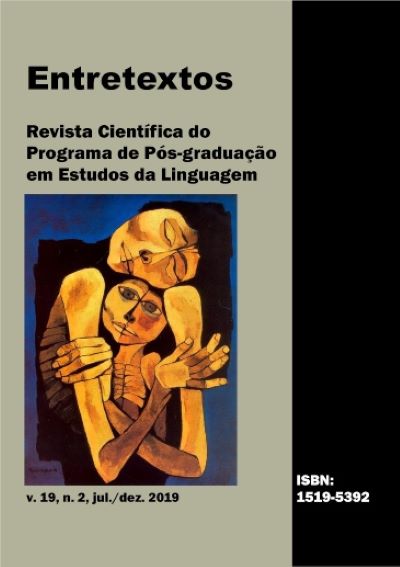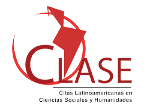Interdisciplinarity in the classroom: cognitive processing in textual interpretation activities
DOI:
https://doi.org/10.5433/1519-5392.2019v19n2p108Keywords:
Textual processing, Reading-writing-interpretation, Classroom, Interdisciplinary actionAbstract
This article presents a research carried out within the scope of the Professional Master's Degree in Languages (PROFLETRAS-UFRPE/UAG) on reading, writing and interpretation of written texts in an interdisciplinary perspective, analyzing the textual cognitive processes built by the students. We are based in studies on genres, reading and textual processing to highlight the linguistic performance of two 6th grade students in a public school on reading-writing-interpretation activities, produced during the application of a didactic interdisciplinary pedagogy (an action research) involving Portuguese Language, Mathematics and Sciences. With activities developed individually for each discipline, always from the same text, we observe that, in order to construct the requested answers in each interpretative question, the children, in one way or another, are mobilizing and activating the cognitive from three great systems of knowledge - the linguistic, the encyclopedic and interactive (KOCH, ELIAS, 2014, KOCH, 2015, 2016). The results demonstrate which cognitive strategies are more or less activated by children in the execution of school activities, a situation that allows the teacher to devise more specific strategies to improve cognitive processing, depending on what knowledge and/or textual strategies need to be activated during reading, interpretation and writing.Downloads
References
ANTUNES, Irandé. Língua, texto e ensino: outra escola possível. São Paulo: Parábola Editora, 2009.
BAKHTIN, Mikhail. Estética da criação verbal. São Paulo: Martins Fontes, 1992.
BAZERMAN, Charles. Escrita, Gênero e interação social. São Paulo: Editora Cortez, 2007.
CAFIERO, Delaine. Letramento e leitura: formando leitores críticos. In: ROJO, Roxane (org.). Explorando o ensino: língua portuguesa. Brasília, DF: PDE, 2010.
DIKSON, Dennys; ROCHA, Macicleide Barros da. A linguística de texto e o processamento textual de tirinhas do Enem. Linguagem, São Carlos, v. 24, n. 1, 2015. versão online. Disponível em:
http://www.linguasagem.ufscar.br/index.php/linguasagem/article/view/103/pdf_5. Acesso em: 30 jan. 2017.
DOLZ, Joaquim; NOVERRAZ, Michele; SCHNEUWLY, Bernard. Sequências didáticas para o oral e a escrita: apresentação de um procedimento. In: DOLZ, Joaquim; SCHNEUWLY, Bernard. Gêneros orais e escritos na escola. Tradução e organização de Roxane Rojo e Glaís Sales Cordeiro. Campinas, SP: Mercado de
Letras, 2004. p. 81-108.
FAZENDA, Ivani, Catarina Arantes. O que é interdisciplinaridade? São Paulo: Cortez, 2008.
GERALDI, João Wanderley (org.). O texto na sala de aula. São Paulo: Anglo, 2012.
JAPIASSU, Hiton. Interdisciplinaridade e patologia do saber. Rio de Janeiro: Imago, 1976.
KOCH, Ingedore G. Villaça. Desvendando os segredos do texto. 8. ed. São Paulo: Cortez, 2015.
KOCH, Ingedore G. Villaça. O texto e a construção dos sentidos. 10. ed. São Paulo: Contexto, 2016.
KOCH, Ingedore G. Villaça; CUNHA-LIMA, Maria Luiza. Do cognitivismo ao sociocognitivismo. In: MUSSALIM, Fernanda; BENTES, Anna Christina (org.). Introdução à linguística: fundamentos epistemológicos. São Paulo: Cortez, 2005. v. 3, p. 251-300.
KOCH, Ingedore G. Villaça; ELIAS, Vanda Maria. Ler e compreender: os sentidos do texto. 3. ed. São Paulo: Contexto, 2014.
MARCUSCHI, Luiz Antônio. Produção textual, análise de gêneros e
compreensão. São Paulo: Parábola, 2008.
TOKARNIA, Mariana. Quase 18% dos alunos dizem sofrer bullying no Brasil, aponta estudo. 2017. https://educacao.uol.com.br/noticias/2017/04/19/quase-
18-dos-alunos-dizem-sofrer-bullying-no-brasil-diz-estudo.htm. Acesso em: 30 jan. 2017.
TRIPP, David. Pesquisa-ação: uma introdução metodológica. Revista Educação e Pesquisa, São Paulo, v. 31, n. 3, p. 443-466, set./dez. 2005. Disponível em:
http://w0ww.scielo.br/pdf/ep/v31n3/a09v31n3.pdf. Acesso em: 30 jan. 2017.
Downloads
Published
How to Cite
Issue
Section
License
Copyright (c) 2019 Entretextos

This work is licensed under a Creative Commons Attribution 4.0 International License.
Entretextos adota a Licença Creative Commons Attribution 4.0 International, portanto, os direitos autorais relativos aos artigos publicados são do/s autor/es.
Sob essa licença é possível: Compartilhar - copiar e redistribuir o material em qualquer suporte ou formato. Adaptar - remixar, transformar, e criar a partir do material, atribuindo o devido crédito e prover um link para a licença e indicar se mudanças foram feitas.
























